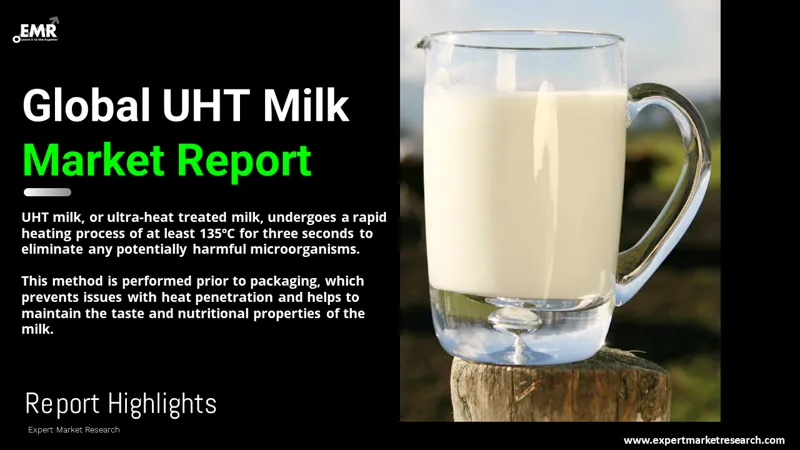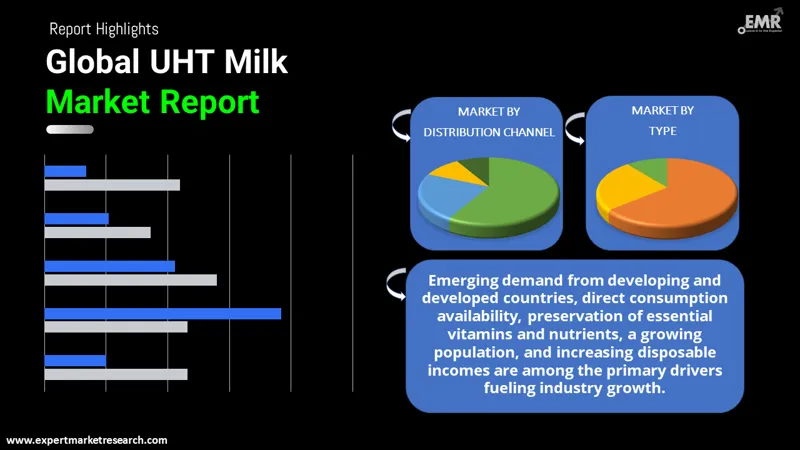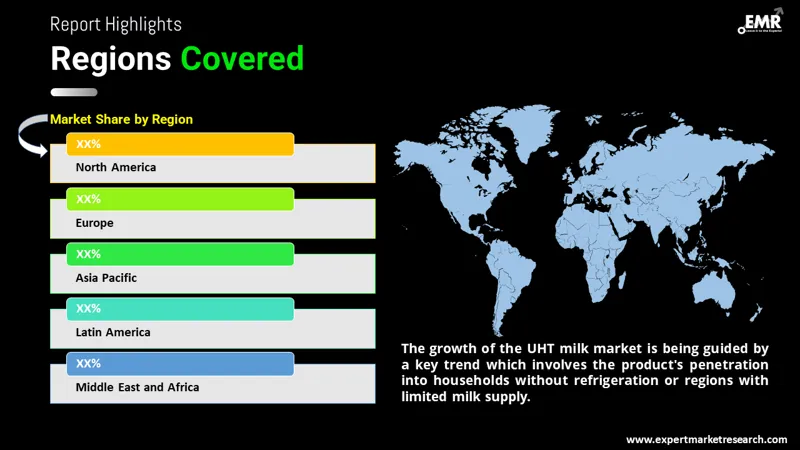
Consumer Insights
Uncover trends and behaviors shaping consumer choices today
Procurement Insights
Optimize your sourcing strategy with key market data
Industry Stats
Stay ahead with the latest trends and market analysis.
Trending Now



The UHT (ultra-high temperature) milk market was valued at USD 218.70 Billion in 2024. The industry is expected to grow at a CAGR of 6.50% during the forecast period of 2025-2034. Consumer demand for food products with longer shelf life drives the market growth. UHT milk can be stored for extended periods without refrigeration. It is the most attractive to consumers in countries where cold chain infrastructure is limited. Further, the market growth is particularly pertinent for consumers in emerging markets and busy on-the-go consumers. All these factors, in turn, have resulted in the market attaining a valuation of USD 410.53 Billion by 2034.
Base Year
Historical Year
Forecast Year
The Gujarat Cooperative Milk Marketing Federation (GCMMF) handles Amul, Asia's largest dairy venture, which exports UHT-processed milk and other products to markets such as China, Hong Kong, Singapore, and the USA. Companies can follow this strategy by investing in UHT milk export towards emerging markets, where currently, the demand for shelf-stable products is much higher.
Fluid milk imports are likely to decrease in 2024 as high-priced domestic ultra-high temperature processing milk production and local demand in the market increase, affecting the growth of the UHT milk market. Hence, UHT processing of locally produced milk with improved efficiency, will enable companies to respond to the increasing domestic market needs where high reliance on imported milk is reduced. This type of activity, apart from local consumers, will give access to more export opportunities with higher margins when local markets are stabilized.
Fluid Milk production in China was estimated at 41,970,000 MT in 2023. This is a rise by an approximately 4.2% increase from 2022, with further is anticipated to grow up to 42,500,000 MT in 2024, marking an additional rise of about 1.3% from 2023. Capitalizing on this insight, UHT milk companies can expand the product portfolio concerning different consumer tastes in developing countries. For example, specialised UHT milk such as lactose-free, fortification and or organic UHT milks can be introduced to tap into the most niche segment of consumers.






Value in USD Billion
2025-2034
UHT Milk Market Outlook
*this image is indicative*
The UHT milk market has grown significantly over the last few years. The market growth was mainly triggered due to consumer demands for ever-longer shelf-lives, convenience and nutrition. UHT is achieved by heating milk at temperatures above 135 degrees for just a few seconds, and that makes it possible for milk to be kept without refrigeration for some time. Therefore, it stands to be one of the most preferred products in places having a limited cold chain infrastructure.
The main challenges hindering the UHT milk market growth have been the consumer perception of UHT milk that concerns the loss of vital nutrients, flavor being inferior to fresh milk, and growing competition from the plant-based beverages in the market. However, companies have introduced new technologies to improve the quality and taste of UHT milk, such as microfiltration that preserves more nutrients and develops flavor to overcome such challenges. Marketing initiatives have also contributed to the market growth. Further, the expanded distribution networks coupled with affordable packaging have made UHT milk very popular among wider sections of people, particularly in emerging markets.

Read more about this report - REQUEST FREE SAMPLE COPY IN PDF
Premium and high-quality products such as organic, grass-fed, or hormone-free UHT milk with added nutrition value contribute as a key segment driving the UHT milk market growth. Consumers in mature markets have been increasingly willing to pay a high premium for more ‘natural’ milk that is ethically sourced. These products often offer better taste and improved nutritional advantages such as higher Omega-3 fatty acids, organic, non-GMO type certifications, and so on. Given the increasing awareness of health and environmental concerns in the general public, such a niche is expected to further grow as it entices more select consumers who are looking for healthier, more sustainable dairy items.
Plant-based UHT-milk alternatives is another notable niche augmenting the global UHT milk market revenue. These kinds of milk include oat milk, almond milk, soy milk, and other UHT formats of plant-based milk. As the popularity of vegan and lactose-intolerant diets increases, these plant-given liquids are proving to be in head-to-head competition for lactogenic tradition. Many companies are already utilizing the advantages of UHT processing for supplying long shelf-life packaging types of plant milks to highlight how easily one can store and distribute them without the need of refrigeration.
Emerging trends observed in the market include growing consumer demand in developing regions, consumer demand for value-added UHT milk, sustainable packaging, and technological advancements in Processing UHT Milk.
The UHT milk market is steadily growing in emerging economies, specifically in Asia, Latin America, and Africa. These markets find it appealing that UHT milk lasts long without adequate refrigeration infrastructure and varying temperature ranges. Higher incomes and increased urbanization result in people demanding more convenient, nutritious dairy alternatives, and UHT milk is fast becoming an important household product. Smaller and cost-effective packages are increasing the reachability of UHT milk, thus making it more appealing towards demand in rural and less developed regions.
The increasing demand for value-added nutrients-rich milk is an emerging trend driving the UHT milk market growth. With a rise in health consciousness among consumers, demand for UHT milk with various nutritional benefits has also been on a hike. Fortified UHT milk with vitamins, minerals, and probiotics have become the latest addition to functional foods. Further, dairy companies are also focusing on the other end of the spectrum, cutting down added sugar in the products and launching low-fat or lactose-free products suited to health-conscious consumers.
Sustainability tends to strike a chord with the growing consumer demand, being a key trend in the UHT milk market. UHT milk firms have turned towards eco-friendly packaging with recyclable or biodegradable cartons to reduce their carbon footprints. Some companies are even documenting "light" packing, which reduces the amount of plastic or uses other forms of plastic in production. Millennials and Gen Z are particularly found to lean more towards brands that match their values in respect to the environment impact. This sustainability trend helps brands to respond to the growing concerns about waste in plastics, and at the same time, it offers an opportunity for brands to differentiate themselves from other players in the market.
Enhancements in the processing technologies for UHT milk is a key trend driving the UHT milk market growth. These contribute to the increase in product quality and efficiency. New methods, such as microfiltration and high-pressure processing (HPP), enable nutrition, flavor, and texture retention all of which are improvements to older concerns about taste and nutrient loss associated with UHT treatment. Innovations like these help UHT milk companies improve how consumers experience this product while reducing operational costs and making the product more competitive with fresh alternatives and plant-based products.
Based on the ongoing trends of plant-based alternatives, a scope for market players appears in the market too. Plant-based UHT milk products containing almond or oat milk could strengthen manufacturers' portfolios if they want to respond to the high demand from consumers who would like healthy and sustainable alternatives for milk. Innovative blends based on traditional dairy ingredients combined with functional ingredients, for example, superfood or probiotic, could attract a large number of health-conscious consumers. This diversification apart, product lines are offered and thus tap new UHT milk market opportunities. Growth in the UHT segment is enhanced because of increased brand loyalty.
Advanced HTST (high-temperature short-time) processing is one of the technologies introduced into the market for UHT milk. This technology in milk processing helps in treating milk at high temperatures, which aids in preserving nutritional quality without damaging it and increasing shelf life, thereby boosting the UHT milk market growth. For example, Tetra Pak has developed new systems in HTST with enhanced energy efficiency and superior speed of processing, thereby increasing the overall capacity for production. This technology not only preserves the taste and nutrients of UHT milk but also reduces operational costs. Introducing all such developments in a company enables it to manufacture more products without compromising their quality and longevity-the two qualities that dairy products are in huge demand for, among consumers.
The UHT milk industry growth is being driven by the growing population, urbanisation, shifting preference towards superior quality over conventional milk, longer shelf life and UHT milk’s capability of being distributed widely without the need for cold chains. UHT milk possesses a longer shelf life compared to traditional milk and it can last for several months at a time even without refrigeration, which further fuels the UHT milk demand. UHT milk also has a high retention capacity which allows it to retain proteins, vitamins, and minerals, among other nutrients, even after being subjected to high temperatures, which is also a crucial factor in propelling the market growth. Additionally, well health organic buffalo milk tag products are becoming popular, providing consumers with more options in the UHT milk category.
Dairy manufacturers are readily fortifying UHT milk with nutrients such as omega-3, protein, vitamins, and minerals to drive market growth. This fortified milk is especially appealing among adults suffering from health concerns such as osteoporosis as well as children in the critical developing stage. Fortification is also promoted by the health authorities and government to address the nutritional deficiencies among consumers, especially in remote areas, pushing the trends in the UHT milk market. Market players are expanding their production facilities and incorporating advanced technologies to enhance their value in the dairy sector. For instance, Heritage Foods, based in India, announced in March 2024, the launch of a new milk plant which specialises in UHT milk production and implements state-of-the-art SIG packaging technology for maintaining milk quality.

Read more about this report - REQUEST FREE SAMPLE COPY IN PDF
“UHT Milk Market Report and Forecast 2025-2034” offers a detailed analysis of the market based on the following segments:
By type, the market is divided into:
Based on distribution channel, the market can be divided into:
Based on region, the market can be segregated into:
By Type Analysis
Full cream UHT milk is gaining popularity worldwide since it offers a rich taste and creamy texture; hence, it pleases the indulgent consumers of dairy products. Semi-skimmed UHT milk is also gaining popularity among those who want to compromise on flavour as well as health, so there is less fat, but there is still creaminess. As per UHT milk market analysis, skimmed UHT milk finds its place among the consumers who are health-conscious and want to cut down on calorie intake, especially the fitness and wellness markets. All three have high demand and usage since they can be applied in numerous cooking and baking applications and are, therefore, very important for usage in different applications across the globe.
Market Analysis By Distribution Channel
UHT milk is sold mainly through supermarkets and hypermarkets. The extensive range of different brands and types are available in very accessible locations. Convenience stores are applied in the case of the on-the-go consumer; they have smaller packs for easy and rapid acquisition at the point of sale. Specialty stores focus on premium UHT milk products, which are mainly of high quality and distinctive for the health-conscious consumer. As per UHT milk industry analysis, online retail is fast picking up, allowing consumers easy comparison shopping, subscription services, and sometimes even delivery right in their homes. Local markets and foodservice establishments contribute to the effectiveness in the distribution of UHT milk products to the different types of consumers.

Read more about this report - REQUEST FREE SAMPLE COPY IN PDF
North America UHT Milk Market Opportunities
One of the significant opportunities in the North America UHT milk market is the increased demand for convenient, long lasting products by busy consumers. This is being achieved by maximising the shelf life of UHT milk, thus serving family interests which appreciate easy storage and fewer leftovers. Companies such as Parmalat, for example, have introduced single-serve UHT milk cartons as well as other products that target on-the-go consumption. The intention behind this approach is such that it does not only cater to the needs of the consumers but also allows the UHT milk to become a sensible choice of health-conscious individuals that seek nutritious, ready-to-drink options.
Europe UHT Milk Market Dynamics
The Europe UHT milk market is experiencing a trend of sustainable packaging. The consumers are becoming environmentally conscious, and hence the manufacturers are adopting new, recyclable, or biodegradable packaging. This shift not only aligns with consumer values but also enhances brand loyalty among eco-conscious shoppers. Companies like Arla Foods look into sustainable packaging technologies that reduce damage to the environment while still managing to keep the product quality intact. This focus on sustainability is becoming a key differentiator in a highly competitive market.
Asia Pacific UHT Milk Market Trends
Increased demand for flavoured UHT milk is storming the UHT milk industry in Asia Pacific. Consumers, particularly the youth, increasingly look forward to having more diversified tastes from milk than the conventional one. Due to the fact that flavouring products, such as chocolate and strawberry, are effective in providing a convenient and tasty beverage, flavoured UHT milk has been increasing in demand. This trend makes the market more attractive to a larger audience and nudges children to consume, thereby generating growth in the UHT market as manufacturers innovate to fulfil the new tastes of the evolving consumers.
Latin America UHT Milk Market Insights
Many consumers in Latin American countries have started looking for lactose-free products, becoming a key opportunity in the Latin America UHT milk market. With growing awareness of lactose intolerance, consumers are opting for dairy products to meet their dietary needs. This has led larger companies like Nestlé to expand their product lines for UHT milk to include lactose-free types, which meets the demand. It not only increases access to the products but also aids in increasing the market as a whole since consumers are selecting their dairy products based on both health and convenience factors.
Middle East and Africa UHT Milk Market Drivers
The growing interest in food safety and quality is an important driver in the Middle East and Africa UHT milk market. Rising concerns over spoilage and contamination have led consumers towards adopting UHT milk mainly based on its longer shelf life and safe packaging. This is especially so in regions that lack infrastructure to support storage in a refrigeration facility. For instance, UHT milk is a constant source of nutrition in rural areas and, therefore, becomes an attractive proposition for retail users who require stable, safe dairy products.
UHT milk market players use product diversification, introducing flavoured and fortified products, drawing more health-oriented consumers to the business. The investment in advanced processing technology adds efficiency and cuts costs and improves profitability for the UHT milk companies. Strategic retail partnerships and e-commerce presence increase its coverage in the marketplace. Effectiveness of campaigns supports building brand loyalty and sales growth in a highly competitive landscape.
Lactalis International, founded in 1933 and based in Laval, France is a major provider of dairy products such as milk, cheese, and butter, among others. The company also offers different kinds of milk such as whole milk, organic milk, semi-skimmed milk, skimmed milk, lactose-free milk, and so on.
Nestle S.A., established in 1866 and based in Vaud, Switzerland, is a food and beverage corporation. Some of its major products include baby food, frozen food, and dairy products, among others. Nido and Bear Brand are the two most popular UHT milk products offered by the company. These two cater to children’s nutrition.
Fonterra Co-operative Group, founded in 2001, is known as one of the leading exporters of dairy products across the world and is widely acclaimed for its sustainability initiative. The company is also popular in the Chinese market for their UHT cream product named Anchor Easy Bakery UHT Cream.
Arla Foods amba, based in Viby, Denmark, is a dairy producer, with acclaimed brands such as Castello, Lurpak, and Puck under its name. The company’s flagship UHT milk products include Lurpak and Arla Cravendale.
*Please note that this is only a partial list; the complete list of key players is available in the full report. Additionally, the list of key players can be customized to better suit your needs.*
Other key players in the global UHT milk market include Danone, among others.
Innovations in new flavours, added nutrition through various fortification options, and green packaging are some of the mainstream practices by the global UHT milk market startups. It has placed several focus on health trends such as plant-based or lactose-free UHT milk and meeting their varying consumer preferences. Moreover, the utilisation of e-commerce platforms helps expand distribution and access to customers for the capture of increasing demand for dairy products that are convenient, long-lasting, and easy to store.
Oatly
Oatly is a Swedish startup that offers quite a number of UHT milk alternatives, which are perfectly suitable for health-conscious and those who do not consume dairy products. Innovation with sustainability in nature, one explains why Oatly has grown and then become popular in the plant-based market.
Rebel Kitchen
Launched in 2014, Rebel Kitchen specializes in organic, plant-based UHT milk beverages with coconut milk options. Focusing on health-conscious consumers, Rebel Kitchen brings together nutrition with great taste, thereby appealing to those searching for sustainable and innovative dairy alternatives in a saturated marketplace.
*While we strive to always give you current and accurate information, the numbers depicted on the website are indicative and may differ from the actual numbers in the main report. At Expert Market Research, we aim to bring you the latest insights and trends in the market. Using our analyses and forecasts, stakeholders can understand the market dynamics, navigate challenges, and capitalize on opportunities to make data-driven strategic decisions.*
Get in touch with us for a customized solution tailored to your unique requirements and save upto 35%!
In 2024, the market reached an approximate value of USD 218.70 Billion.
The UHT milk market is assessed to grow at a CAGR of 6.50% between 2025 and 2034.
The market is estimated to witness healthy growth in the forecast period of 2025 and 2034 to reach a value of around USD 410.53 Billion by 2034.
The major drivers of the industry include the emerging demand from both developing and developed countries, availability of direct consumption, perseverance of essential vitamins and nutrient, increasing population, and rising disposable incomes.
The key trend guiding the growth of the UHT milk market includes the penetration of the product in non-fridge households or those regions which have scarce supply of milk.
The major regions in the market are North America, Latin America, the Middle East and Africa, Europe, and the Asia Pacific, with Europe accounting for the largest market share.
The major types of the product in the market are full cream, semi skimmed, and skimmed.
The significant distribution channels of the product are supermarkets and hypermarkets, convenience stores, speciality stores, online retail, and others.
The major players in the market are Lactalis International, Nestle S.A., Fonterra Co-operative Group, Arla Foods amba, and Danone, among others.
Explore our key highlights of the report and gain a concise overview of key findings, trends, and actionable insights that will empower your strategic decisions.
| REPORT FEATURES | DETAILS |
| Base Year | 2024 |
| Historical Period | 2018-2024 |
| Forecast Period | 2025-2034 |
| Scope of the Report |
Historical and Forecast Trends, Industry Drivers and Constraints, Historical and Forecast Market Analysis by Segment:
|
| Breakup by Type |
|
| Breakup by Distribution Channel |
|
| Breakup by Region |
|
| Market Dynamics |
|
| Competitive Landscape |
|
| Companies Covered |
|
| Report Price and Purchase Option | Explore our purchase options that are best suited to your resources and industry needs. |
| Delivery Format | Delivered as an attached PDF and Excel through email, with an option of receiving an editable PPT, according to the purchase option. |
Datasheet
One User
USD 2,499
USD 2,249
tax inclusive*
Single User License
One User
USD 3,999
USD 3,599
tax inclusive*
Five User License
Five User
USD 4,999
USD 4,249
tax inclusive*
Corporate License
Unlimited Users
USD 5,999
USD 5,099
tax inclusive*
*Please note that the prices mentioned below are starting prices for each bundle type. Kindly contact our team for further details.*
Flash Bundle
Small Business Bundle
Growth Bundle
Enterprise Bundle
*Please note that the prices mentioned below are starting prices for each bundle type. Kindly contact our team for further details.*
Flash Bundle
Number of Reports: 3
20%
tax inclusive*
Small Business Bundle
Number of Reports: 5
25%
tax inclusive*
Growth Bundle
Number of Reports: 8
30%
tax inclusive*
Enterprise Bundle
Number of Reports: 10
35%
tax inclusive*
How To Order
Our step-by-step guide will help you select, purchase, and access your reports swiftly, ensuring you get the information that drives your decisions, right when you need it.

Select License Type
Choose the right license for your needs and access rights.

Click on ‘Buy Now’
Add the report to your cart with one click and proceed to register.

Select Mode of Payment
Choose a payment option for a secure checkout. You will be redirected accordingly.
Gain insights to stay ahead and seize opportunities.

Get insights & trends for a competitive edge.

Track prices with detailed trend reports.

Analyse trade data for supply chain insights.

Leverage cost reports for smart savings

Enhance supply chain with partnerships.

Connect For More Information
Our expert team of analysts will offer full support and resolve any queries regarding the report, before and after the purchase.
Our expert team of analysts will offer full support and resolve any queries regarding the report, before and after the purchase.
We employ meticulous research methods, blending advanced analytics and expert insights to deliver accurate, actionable industry intelligence, staying ahead of competitors.
Our skilled analysts offer unparalleled competitive advantage with detailed insights on current and emerging markets, ensuring your strategic edge.
We offer an in-depth yet simplified presentation of industry insights and analysis to meet your specific requirements effectively.



Australia
63 Fiona Drive, Tamworth, NSW
+61-448-061-727
India
C130 Sector 2 Noida, Uttar Pradesh 201301
+91-723-689-1189
Philippines
40th Floor, PBCom Tower, 6795 Ayala Avenue Cor V.A Rufino St. Makati City,1226.
+63-287-899-028, +63-967-048-3306
United Kingdom
6 Gardner Place, Becketts Close, Feltham TW14 0BX, Greater London
+44-753-713-2163
United States
30 North Gould Street, Sheridan, WY 82801
+1-415-325-5166
Vietnam
193/26/4 St.no.6, Ward Binh Hung Hoa, Binh Tan District, Ho Chi Minh City
+84-865-399-124
United States (Head Office)
30 North Gould Street, Sheridan, WY 82801
+1-415-325-5166
Australia
63 Fiona Drive, Tamworth, NSW
+61-448-061-727
India
C130 Sector 2 Noida, Uttar Pradesh 201301
+91-723-689-1189
Philippines
40th Floor, PBCom Tower, 6795 Ayala Avenue Cor V.A Rufino St. Makati City, 1226.
+63-287-899-028, +63-967-048-3306
United Kingdom
6 Gardner Place, Becketts Close, Feltham TW14 0BX, Greater London
+44-753-713-2163
Vietnam
193/26/4 St.no.6, Ward Binh Hung Hoa, Binh Tan District, Ho Chi Minh City
+84-865-399-124
Share